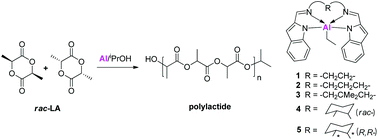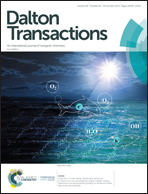Aluminum complexes with Schiff base bridged bis(indolyl) ligands: synthesis, structure, and catalytic activity for polymerization of rac-lactide†
Abstract
A series of Schiff base bridged bis(indolyl) ligands were developed for aluminum chemistry. The reactions of AlEt3 or AlMe3 with the Schiff base bridged bis(indolyl) proligands R1(–N![[double bond, length as m-dash]](https://www.rsc.org/images/entities/char_e001.gif) CHC8H5NH)2 (R1 = –CH2CH2– (H2L1); –CH2CH2CH2– (H2L2); –CH2CMe2CH2– (H2L3); rac-Cy (H2L4); and R,R-Cy (H2L5)) were studied leading to the synthesis of a series of aluminum alkyl complexes L1AlEt (1)–L5AlEt (5) and L3AlMe (3b) in good yields, while the reaction of H2L3 with Al(OiPr)3 gave the aluminum alkoxide complex L3AlOiPr (3a). These aluminum complexes were characterized by spectroscopic methods and elemental analyses. The solid state structures of the aluminum complexes 1–5 and 3a were confirmed by the X-ray diffraction study. X-ray analyses revealed that the aluminum centre in these complexes is five-coordinated. The coordination geometry is between square pyramidal and trigonal bipyramidal. In the presence of 1 equiv. of isopropanol, the aluminum alkyl complexes exhibited notable activity towards the ring-opening polymerization of rac-lactide at 70 °C in toluene, with good control over molecular weights and dispersities. The substituents and the length of the bridging part between the two Schiff base nitrogen atoms have an influence on either the tacticity of isolated polymers or the rate of polymerization. The kinetics of complex L3AlOiPr (3a) in C6D6 was also investigated, and the experimental results revealed that the rate of polymerization was first-order with respect to rac-lactide.
CHC8H5NH)2 (R1 = –CH2CH2– (H2L1); –CH2CH2CH2– (H2L2); –CH2CMe2CH2– (H2L3); rac-Cy (H2L4); and R,R-Cy (H2L5)) were studied leading to the synthesis of a series of aluminum alkyl complexes L1AlEt (1)–L5AlEt (5) and L3AlMe (3b) in good yields, while the reaction of H2L3 with Al(OiPr)3 gave the aluminum alkoxide complex L3AlOiPr (3a). These aluminum complexes were characterized by spectroscopic methods and elemental analyses. The solid state structures of the aluminum complexes 1–5 and 3a were confirmed by the X-ray diffraction study. X-ray analyses revealed that the aluminum centre in these complexes is five-coordinated. The coordination geometry is between square pyramidal and trigonal bipyramidal. In the presence of 1 equiv. of isopropanol, the aluminum alkyl complexes exhibited notable activity towards the ring-opening polymerization of rac-lactide at 70 °C in toluene, with good control over molecular weights and dispersities. The substituents and the length of the bridging part between the two Schiff base nitrogen atoms have an influence on either the tacticity of isolated polymers or the rate of polymerization. The kinetics of complex L3AlOiPr (3a) in C6D6 was also investigated, and the experimental results revealed that the rate of polymerization was first-order with respect to rac-lactide.



 Please wait while we load your content...
Please wait while we load your content...